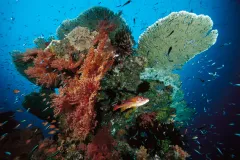Coral Reefs Need You

For those of you who have had the opportunity to visit a coral reef, you know that it’s an experience you are unlikely to forget.
Coral reefs are among the world’s most magnificent ecosystems. Their beauty alone makes them incalculably valuable, but beyond aesthetics, their importance to both marine life and humans is immense.
Though they cover less than one percent of the ocean floor, coral reefs support an estimated 25 percent of all marine life. They generate billions of dollars and millions of jobs in more than 100 countries around the world, and provide an important local food source and storm protection for nearby communities. Moreover, coral reef species provide researchers with unique chemical compounds that are being used to develop life-saving medicines.
Unfortunately, coral reefs are in serious decline. We’ve already lost nearly 20 percent of the world’s coral reefs over the past few decades, and scientists predict that we could lose most of our remaining reefs by 2050…unless we take immediate action to protect them. That’s where you—and everyone you know—can help.
If you are going to visit a coral reef destination, here are some simple tips you can follow to support and preserve the health of coral reef ecosystems.
Do Your Homework
Before you plan your next vacation, take the time to research and choose an environmentally-friendly resort or hotel—one that practices energy conservation, recycles, and treats sewage and solid waste in responsible ways. You’d be surprised, but some tourist resorts empty their sewage directly into the water surrounding coral reefs.
Divers and snorkelers are some of the strongest and most effective advocates for coral reef conservation. So before you grab your mask and fins, be sure to research and choose a responsible dive operator. When recreational boats drop anchors on or near reefs, they crush corals and churn up sediments that can smother the reef. Make sure you choose an operator who avoids damaging reefs by securing boats to mooring buoys (if they’re available), or anchoring far from the reef.
Explore Responsibly
When in the water, never stand or rest on coral. Corals are fragile animals, and even the slightest contact can harm them. Remember to secure your equipment to prevent it from accidentally brushing or snagging corals, and make sure you are neutrally buoyant at all times. Maintain a comfortable distance (at least an arm’s length) from the reef and avoid kicking up sand with your fins. Make sure you take nothing living or dead out of the water, and avoid purchasing souvenirs made from coral, turtles, or other marine life.
Support Marine Parks
Marine protected areas are essential for coral reef conservation, so it is important to choose a vacation destination that has these protected zones. When visiting a marine park, be sure to pay the user fee or make a donation to help fund continued conservation and management of the park. In some cases, your donation helps provide revenue for the local communities that depend on the reef for their livelihood.
Corals face an increasingly uncertain future, but there is still time to affect meaningful positive change. As a responsible visitor, you can play an important role in protecting this vital resource, and you can make an even greater impact by spreading the word. Become an advocate for coral reef conservation and share these important conservation practices with others.
Happy exploring!

